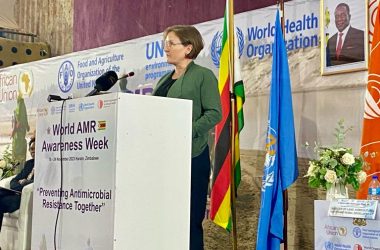A warning call to men
By Conrad Mwanawashe

Did you take a bath today?
Not the “passport size” type of bath, where you just wipe your face and armpits.
A snap survey I held on ten men today revealed that seven didn’t.
It’s hot, temperatures above 24° C, in July, the excuse was the cold weather.
The seven males had not even had that quick in, and fast out session, where you just “pass through” water!
Oral hygiene also lacked. Only five had bothered to brush their teeth.
With the above evidence, I did not ask further questions on personal under clothing hygiene. It’s everyone’s guess.
Men are usually guilty of poor hygiene, and that makes them prone to diseases related to hygiene.
According to a cholera cases distribution by gender for the period September 20 — November 6, 2023, produced by the Harare City Council, 58% of males are affected with cholera as compared to women, 42%.
 “I don’t know what the problem is with us men. Most of the times the males are more affected than females. Most of the disease burdens, especially those to do with hygiene, males are more affected. Even in the previous outbreaks, we actually discovered that males are more affected than females in general. This helps us to craft our messages to target men and the areas that they usually play around so that we can also reduce the burden of disease in males,” said Dr Michael Vere, Head of Epidemiology and Disease Control for Harare.
“I don’t know what the problem is with us men. Most of the times the males are more affected than females. Most of the disease burdens, especially those to do with hygiene, males are more affected. Even in the previous outbreaks, we actually discovered that males are more affected than females in general. This helps us to craft our messages to target men and the areas that they usually play around so that we can also reduce the burden of disease in males,” said Dr Michael Vere, Head of Epidemiology and Disease Control for Harare.
Dr Vere was updating health journalists on the current cholera situation in Harare at a week-long workshop for Health Journalists hosted by the Ministry of Health and Child Care (MoHCC) with support from Higher Life Foundation.
Dr Vere bemoaned that hygiene was lower in males as compared to females.
This was evident in the disparity of cholera infection being higher in males.
“I think we can all agree that if we do not address issues to do with water, sanitation and hygiene (WASH) we will never go on top of the situation with regards cholera,” Dr Vere added.
WASH has two components, according to Dr Vere; (i) infrastructure issues — water supply, dams, reticulation systems, that is, treatment plans and (ii) software issues — our ability to treat that water.
Roadside meals are popular with males. Meat, boiled eggs sold at beer halls are consumed by a majority of males.
The food is prepared in an unhygienic environment where clean water is lacking.
There is no water to wash hands. It is, therefore, not surprising that cholera is hitting males more than females.
Proper ablution facilities lack, too, with the bush used to relieve patrons. Open defecation is a cholera vehicle. More males relieve themselves in public than females. One is back to eat and drink without washing hands.
“One irregular food vending place in Crowborough was closed. Crowborough is one of the suburbs with cholera cases.The owner fell ill and was hospitalised in Beatrice Infectious Diseases Hospital. Many people who fell ill in Crowborough were traced to that particular place,” said Dr Vera.
According to the United Nations, access to safe water, sanitation, and hygiene is the most basic human need for health and well-being. Billions of people will lack access to these basic services in 2030 unless progress quadruples. Demand for water is rising owing to rapid population growth, urbanization, and increasing water needs from agriculture, industry, and energy sectors.
The demand for water has outpaced population growth, and half the world’s population is already experiencing severe water scarcity at least one month a year. Water scarcity is projected to increase with the rise of global temperatures as a result of climate change.
The UN says that in 2022, 2.2 billion people still lacked safely managed drinking water, including 703 million without a basic water service; 3.5 billion people lacked safely managed sanitation, including 1.5 billion without basic sanitation services; and two billion lacked a basic handwashing facility, including 653 million with no handwashing facility at all.
Sustainable Development Goal (SDG) Target 6.2 — sanitation and hygiene targets to achieve access to adequate and equitable sanitation and hygiene for all and end open defecation, paying special attention to the needs of women and girls and those in vulnerable situations by 2030.
Generally, most of the suburbs in Harare have reported cholera cases generally.
The current cholera outbreak as of November 8, 2023, shows:
- 191 suspected cases
- 47 confirmed cases
- 4 deaths
The majority of cases are in the Western District and Southern District
The last confirmed case was in Mufakose with the date of onset on November 3.
“Of late, we have started having cases from the Northern District, which includes Kuwadzana, Dzivarasekwa, Paddocks, Crowborough, and surrounding areas. This means that there’s no hiding place in Harare. Everywhere you go, you’re at risk of getting cholera,” said Dr Vere.
“The underground water in the western areas of Harare are contaminated because this where all the sewer from Harare goes. This is why we see perennial problems of cholera in the western areas compared to the eastern part,” he added.
Cholera is a preventable disease. Hygiene is paramount to curb the further spread of it.
Feedback: cmwanawashe@marichomedia.com










